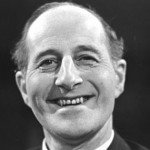 Terence O’Neill (1914-1990) was a Unionist politician and the second-last prime minister of Northern Ireland. O’Neill was born in London, the son of an Irish politician who was killed in World War I five months later. The young O’Neill was educated in English public schools like Winchester and Eton, spending his summer holidays at the family estate in Antrim. He was later commissioned in the British army, rising to the rank of captain and serving with the Irish Guards in World War II. O’Neill was wounded in 1944 and opted to resettle permanently in Northern Ireland. In 1946 he was elected to the Northern Ireland parliament, representing the Unionist stronghold of Bannside. He would remain in the parliament at Stormont for almost 25 years.
Terence O’Neill (1914-1990) was a Unionist politician and the second-last prime minister of Northern Ireland. O’Neill was born in London, the son of an Irish politician who was killed in World War I five months later. The young O’Neill was educated in English public schools like Winchester and Eton, spending his summer holidays at the family estate in Antrim. He was later commissioned in the British army, rising to the rank of captain and serving with the Irish Guards in World War II. O’Neill was wounded in 1944 and opted to resettle permanently in Northern Ireland. In 1946 he was elected to the Northern Ireland parliament, representing the Unionist stronghold of Bannside. He would remain in the parliament at Stormont for almost 25 years.
O’Neill became Northern Ireland’s home affairs minister in 1955, finance minister in 1956 and prime minister in 1963. As premier he introduced economic reforms to stimulate industrial growth and employment, with mixed results. O’Neill also tried narrowing the divide between Protestants and Catholics. He did this with important gestures, like visiting Catholic schools and expressing condolences on the death of Pope John XXIII. O’Neill also sought better relations with the Republic of Ireland, and in January 1965 he invited the Irish taoiseach to Belfast. Catholics and moderate Unionists welcomed this reconciliation but many conservative Loyalists, like Ian Paisley, condemned it as treachery. When the civil rights movement erupted in the late 1960s O’Neill offered a package of reforms and concessions, including changes to the allocation of housing. These proposals, however, angered staunch Unionists and failed to satisfy many Republicans.
In December 1969 O’Neill appeared on Northern Ireland television and made an impassioned plea for unity, warning that “Ulster stands at the crossroads“. His government was reelected in February 1969, though O’Neill himself was almost voted out of his own seat. With the situation worsening, O’Neill was further embarrassed by Loyalist attempts to sabotage Belfast’s water supply. Fast losing the confidence of his own party, O’Neill resigned the prime ministership in April. He remained in the parliament until January 1970. O’Neill was made Baron O’Neill of the Maine and spent the last decade of his life in Britain’s House of Lords. He died in June 1990.
© Alpha History 2017. Content on this page may not be republished or distributed without permission. For more information please refer to our Terms of Use.
This page was written by Rebekah Poole and Jennifer Llewellyn. To reference this page, use the following citation:
R. Poole & J. Llewellyn, “Terence O’Neill”, Alpha History, accessed [today’s date], https://alphahistory.com/northernireland/terence-oneill/.
